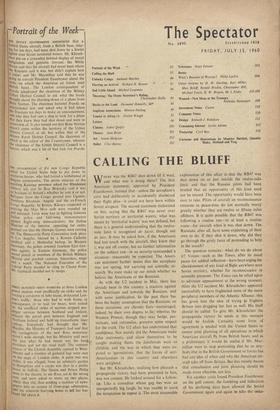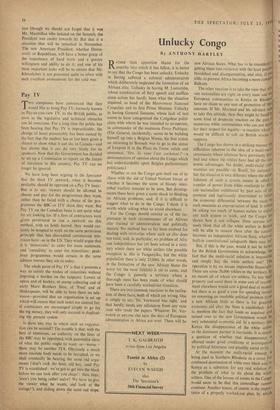CALLING THE BLUFF
WHERE was the RB47 shot down (if it was), and what was it doing there? The first American statement, approved by President Eisenhower, insisted that—unless the aeroplane's crew had deliberately or accidentally disobeyed their flight plan—it could not have been within Soviet airspace. The second statement elaborated on this, saying that the RB47 was never over Soviet territory or territorial waters; what was meant by 'territorial waters' was not defined, but there is a general understanding that the twelve- mile limit is recognised de facto, though not de jure. It may be asked how, if the Americans had lost touch with the aircraft, they knew that it was not off course; but no further information on the subject can—in so security-surrounded a situation—reasonably be expected. The Ameri- can statement further insists that the aeroplane was not spying, but carrying out scientific re- search. We must make up our minds whether we believe the Americans or the Russians.
As with the U2 incident in May, there has already been in this country a reaction against the Americans and towards the Russians. and with some justification. In the past there has been the happy assumption that the Russians, on these occasions; are chronic liars—encouraged, indeed, by their own dogma to lie; whereas the Western Powers, though they may hedge, pre- varicate, and rationalise, preserve some respect for the truth. The U2 aflair has undermined that confidence. Not merely did the Americans make false statements, and allow themselves to be caught making them; the falsehoods were so childish, and the way in which they were ex- posed so ignominious, that the forces of anti- Americanism in this country and elsewhere were delighted.
But Mr. Khrushchev, realising how pleasant a propaganda victory had been presented to him, was not content. He looked around for a follow- up. Like a comedian whose gag has won an unexpectedly big laugh, he was unable to resist the temptation to repeat it. The most reasonable explanation of this affair is that the RB47 was shot down on or just outside the twelve-mile limit, and that the Russian pilots had been briefed that an opportunity of this kind need not be missed. The opportunity would have been easy to take. Pilots of aircraft on reconnaissance missions in peace-time do not normally worry greatly whether they are twelve or fifteen miles offshore. It is quite possible that the RB47 was following a routine run—or at least a routine route—for aircraft when it was shot down. The Russians, after all, have some explaining of their own to do. If they shot it down, why did they go through the grisly farce of pretending to help in the search?
The question remains: what do we do about it? Voices—such as the Times, after its usual pause for addled reflection—have been urging the abandonment of any kind of flight anywhere near Soviet territory, whether for reconnaissance or scientific purposes. The Times can be relied upon to advocate appeasement at the wrong moment. After the U2 incident Mr. Khrushchev appeared successfully to have frightened some of the more peripheral members of the Atlantic Alliance; this has given him the idea of trying to frighten Britain into dragging her feet as well. His bluff should be called. To give Mr. Khrushchev the propaganda victory he needs at this moment would be foolish. Certainly some form of agreement is needed with the United States to ensure joint planning of all operations in which American aircraft fly from British bases; and as a preliminary it would be useful if Mr. Mac- millan were to stop pretending that he or any- body else in the British Government or forces has had any idea of when and why the American air- craft take off from Britain. But this merely means that consultation and joint planning should be made more effective, not less.
Yet another crisis found President Eisenhower on the golf course; the fumbling and indecision of his declining days have allowed the Soviet Government again and again to take the initia- live (though we should not forget that It was Mr. Macmillan who insisted on the Summit; the President was cooler towards it). But that is a situation that will be remedied in November. The new American President, whether Demo- cratic or Republican, will have a better grasp of the importance of hard work and a greater willingness and ability to do it; and one of his most important tasks will be to ensure that Mr. Khrushchev is not presented quite so often with such excellent ammunition for the cold war.







































 Previous page
Previous page